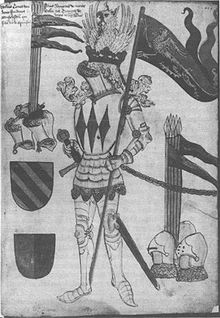William Montacute, 1st Earl of Salisbury
| The Earl of Salisbury | |
|---|---|

William Montagu from the Salisbury Roll, c. 1463. He displays the Montagu arms (modern) Argent, three fusils conjoined in fess gules on his breastplate, whilst his maternal arms of de Montfort (Bendy of eight or and azure) are shown on a shield at left.
|
|
| Born | 1301 Cassington, Oxfordshire |
| Died | 30 January 1344 Windsor, Berkshire |
| Cause of death | Injuries from a tournament |
| Resting place | Bisham Abbey, Berkshire |
| Other names | William Montacute |
| Years active | c. 1320–1344 |
| Known for | Service to Edward III |
| Title | Earl of Salisbury |
| Predecessor | New creation |
| Successor | William Montagu, 2nd Earl of Salisbury |
| Spouse(s) | Catherine Grandison |
| Children | William Montagu, 2nd Earl of Salisbury, John Montagu, 4 daughters |
| Parent(s) |
William Montagu, 2nd Baron Montagu, Elizabeth de Montfort |
William Montagu, alias de Montacute, 1st Earl of Salisbury, 3rd Baron Montagu, King of Mann (1301 – 30 January 1344) was an English nobleman and loyal servant of King Edward III.
The son of William Montagu, 2nd Baron Montagu, he entered the royal household at an early age and became a close companion of the young Prince Edward. The relationship continued after Edward was crowned king following the deposition of Edward II in 1327. In 1330, Montagu was one of Edward's main accomplices in the coup against Roger Mortimer, who until then had been acting as the king's protector.
In the following years Montagu served the king in various capacities, primarily in the Scottish Wars. He was richly rewarded, and among other things received the lordship of the Isle of Man. In 1337, he was created Earl of Salisbury, and given an annual income of 1000 marks to go with the title. He served on the Continent in the early years of the Hundred Years' War, but in 1340 he was captured by the French, and in return for his freedom had to promise never to fight in France again. Salisbury died of wounds suffered at a tournament early in 1344.
Legend has it that Montagu's wife Catherine was raped by Edward III, but this story is almost certainly French propaganda. William and Catherine had six children, most of whom married into the nobility. Modern historians have called William Montague Edward's "most intimate personal friend" and "the chief influence behind the throne from Mortimer's downfall in 1330 until his own death in 1344."
William Montagu, born at Cassington, Oxfordshire in 1301, was the second but eldest surviving son of William Montagu, 2nd Baron Montagu, and Elizabeth de Montfort, daughter of Sir Peter Montfort of Beaudesert, Warwickshire. by Matilda/Maud de la Mare daughter and heiress of Henry de la Mare of Ashtead, Surrey, Royal Justice, Seneschal of William Longspree II Earl of Salisbury. The Montagu family, a West Country family with roots going back to the Conquest, held extensive lands in Somerset, Dorset and Devon. The father, William Montagu, distinguished himself in the Scottish Wars during the reign of Edward I, and served as steward of Edward II's household. Some members of the nobility, including Thomas of Lancaster, viewed Montagu with suspicion, as a member of a court party with undue influence on the king. For this reason he was sent to Aquitaine, to serve as seneschal. Here he died on 18 October 1319. Even though he sat in parliament as a baron, the second lord Montagu never rose above a level of purely regional importance.
...
Wikipedia
